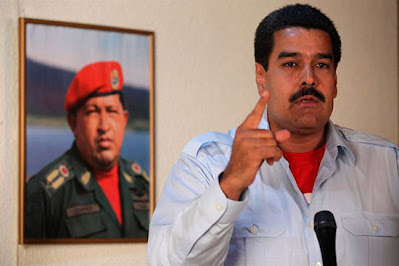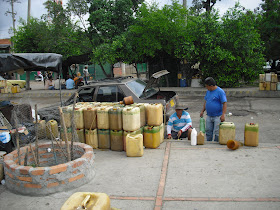It’s just over five months since we wrote that the time, perhaps, was right for a change of the guard in Venezuela.
That was, of course, ahead of the October elections when the-then incumbent president, the late Hugo Chávez, was facing his toughest democratic challenge for the country’s top job since he first took office in 1999.
Despite leading a solid campaign which garnered widespread support – his 45% share of the votes testament to that – challenger Henrique Capriles fell short; Chávez retained his post with 54% support.
 |
| Past & present: Cházez (l) & Maduro (from paraguay.com). |
Venezuela, especially the current administration’s key voter base of the lower/working classes, clearly said it wasn’t ready to say goodbye to ‘Socialism for the 21st Century’ at that time.
So as the country prepares once again to go the polls on 14 April – constitutionally necessary following Chávez’s death – is there any reason to think that the challenger can turn the tables in just six months?
Undeniably, the ruling party is weaker without its charismatic and hugely popular deceased leader calling the shots. You don’t lose a chief such as Chávez without this having some adverse effect. However, it might be too soon to see that cost just yet.
It’s difficult to improve on an 80% turnout, as was the case in October, but if there are new votes and voters to be found, they may go the way of president-in-charge and Chavez’s ‘anointed’ successor, Nicolás Maduro. While a dull figure compared to his predecessor – who wouldn’t be – he should still be in a position to benefit from Chávez’s popularity, with the former leader’s figure still shining bright for many.
So as the country prepares once again to go the polls on 14 April – constitutionally necessary following Chávez’s death – is there any reason to think that the challenger can turn the tables in just six months?
Undeniably, the ruling party is weaker without its charismatic and hugely popular deceased leader calling the shots. You don’t lose a chief such as Chávez without this having some adverse effect. However, it might be too soon to see that cost just yet.
It’s difficult to improve on an 80% turnout, as was the case in October, but if there are new votes and voters to be found, they may go the way of president-in-charge and Chavez’s ‘anointed’ successor, Nicolás Maduro. While a dull figure compared to his predecessor – who wouldn’t be – he should still be in a position to benefit from Chávez’s popularity, with the former leader’s figure still shining bright for many.
Indeed, early opinion polls suggest Maduro has a lead of up to 15%. If this was to be the actual result on polling day, it would be a bigger endorsement for the socialist government than that it received just months ago.
In such a politically divided country – you are either with the revolution or against it, there is very little room for those in the middle ground – it’s hard to see where Capriles can add to the support he gained last year.
Focusing the campaign on the abuses of the Chávez administration – the more than questionable human rights record, an increase in homicides and an absence of general security, press and judicial interference, currency & economic problems – abuses highlighted by a number of non-governmental organisations including Human Rights Watch and Amnesty International, is one avenue of attack.
There is also the issue of Venezuela’s over-reliance on oil to keep the economy moving. In the short-to-medium term, this is fine, but, like the oil resources themselves, how sustainable is it?
 |
| 'Black gold' on the Colombian-Venezuelan border. |
Yet, for the thousands of people who have seen an unprecedented rise in their general standard of living and their access to education and health improve under the current socialist government, this approach in focusing on other policy areas, however justified, is unlikely to yield much electoral dividend.
What’s more, with a population – especially those in support of the revolution – seemingly convinced by the political elite that the nation, at any moment, could be attacked by ‘Western imperialists’, anti-US discourse continues to excite and impress many.
Thus, the them-versus-us mentality, which Capriles hopes to weaken should he get elected, has been promoted heavily by his opponent.
However, for any neutral observer, regardless of which side of the political spectrum you lie, Maduro’s inconsistent and lurid pronouncements in this regard in recent days have been nothing but playing to the gallery.
However, for any neutral observer, regardless of which side of the political spectrum you lie, Maduro’s inconsistent and lurid pronouncements in this regard in recent days have been nothing but playing to the gallery.
From firstly claiming there was a CIA/Pentagon plan to assassinate his rival Capriles in order to cause chaos in the country, he flipped the next day to a story that the US was encouraging the opposition to withdraw from the elections. If the White House is planning something, it doesn’t seem to be very consistent if Maduro is to be believed.
Throwing all these factors together, it is difficult to see anything other than a relatively comfortable victory for the interim president.
Indeed, for the time being, for the general stability of the region, especially in relation to the border with Colombia, a Maduro victory might be for the best.
Throwing all these factors together, it is difficult to see anything other than a relatively comfortable victory for the interim president.
Indeed, for the time being, for the general stability of the region, especially in relation to the border with Colombia, a Maduro victory might be for the best.
If the socialist revolution was stopped in its tracks now, democratically, it’s unclear how the current administration and its supporters would react, especially so soon after Chávez’s death. A second defeat in six months for Capriles would no doubt leave him and his followers disillusioned, but a violent reaction to such an outcome is unlikely.
In terms of Colombian relations, with the ongoing, largely fragile peace talks continuing between President Juan Manuel Santos’s government and the left-wing guerrillas Farc, instability in Venezuela is the last thing that process needs.
Yes, it’s widely accepted here that the Bolivarian Republic has supported the Farc rebels in terms of ammunition and security, but the fear is that if an unfavourable government for them was to be installed in Venezuela, it may have a negative influence on the peace negotiations.
That’s despite the fact that the majority of Colombians, arguably the most pro-USA Latin America country with a history of centre-right administrations, would find more favour, in general, with Capriles in power than Maduro.
Whatever the case, it appears the mantra from the current office-holders in Venezuela, that the country’s ‘Socialism for the 21st Century’ is bigger than one man, is set to be put to a stern test in the coming months and years.
In terms of Colombian relations, with the ongoing, largely fragile peace talks continuing between President Juan Manuel Santos’s government and the left-wing guerrillas Farc, instability in Venezuela is the last thing that process needs.
 |
| Support: But is it enough for Capriles? |
That’s despite the fact that the majority of Colombians, arguably the most pro-USA Latin America country with a history of centre-right administrations, would find more favour, in general, with Capriles in power than Maduro.
Whatever the case, it appears the mantra from the current office-holders in Venezuela, that the country’s ‘Socialism for the 21st Century’ is bigger than one man, is set to be put to a stern test in the coming months and years.
It may be more of the same after 14 April but perhaps with even deeper division.
*For another Venezuelan related article see 'Venezuela - South America's North Korea?' http://bit.ly/OLR2Ev
*For another Venezuelan related article see 'Venezuela - South America's North Korea?' http://bit.ly/OLR2Ev
No comments:
Post a Comment